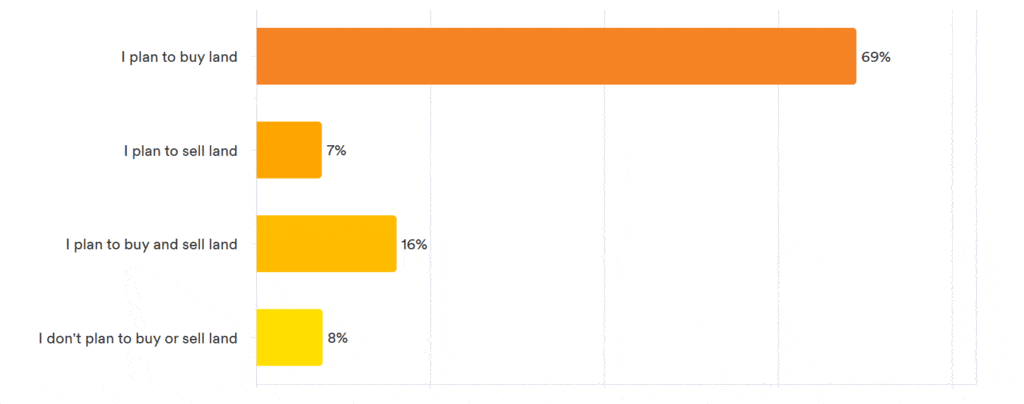According to the January LANDTHINK Pulse results, 69% of respondents plan to buy land in 2025. Despite uncertainty about the real estate market in the air, many buyers are entering 2025 with bold optimism. It’s been a tough few years for the land market, thanks to climbing prices, low inventory, and high interest rates, leaving many hopeful land buyers eager to get off the sidelines.
Last month, the January Pulse asked: Do you plan to buy or sell land in 2025?

Buyers faced tough market conditions in 2024. “Interest rates and prices have gone up a lot in the last three years, and that combination has discouraged people who want to buy land,” according to LANDFLIP Founder Ryan Folk. “The biggest problem is that there isn’t enough land for sale,” Folk added. “The low inventory pushes prices upward as buyers compete with one another.” As interest rates begin to cool and markets show signs of strength, 2025 is slated to bring a balanced, healthy land real estate environment, offering opportunities for both buyers and sellers alike.
“With the recent election over, buyers are feeling more confident in the direction of the economy. Without a doubt, I’m seeing increased buyer activity,” Folk said.
Investors are increasingly learning the value of land, and it continues to increase in popularity. It can be a smart strategy for building wealth, developing real estate, or creating your dream property.
The stock market has been surging over the last couple of years, and we are entering the third year of the current bull market. Some investors are worried about how long these good times will last. Daily fluctuations and minor market corrections have left some investors on edge. Trump tariffs, coupled with worries about inflation, have investors that prefer stability and control rethinking stocks and looking at safer, non-traditional ways to diversify their portfolio.
With evolving market conditions in 2025, many investors and buyers are considering whether this is the right time to purchase land for sale. Let’s explore the factors driving land investment opportunities:
Land Development Presents a “Blue Ocean” of Opportunity
In light of the impending housing crisis and urban expansion driving the need for new construction, the demand for land development continues to grow.
- Residential Development: The demand for land to build affordable housing continuing to grow stronger and stronger. Developers are buying bare land nationwide and a huge chunk of that is the development of residential communities.
- Commercial and Industrial Uses: As e-commerce expands, demand for land to accommodate warehouses, distribution centers, and mixed-use developments is also rising. Demand for data center land is also soaring.
- Custom Home Building: Remote work has spurred demand for custom homes. Buyers are choosing to purchase land to build custom homes with features that support a productive work-from-home environment.
The Affect of Rising Interest Rates
Higher interest rates can make financing for developed properties more expensive, but land purchases may still be an attractive option.
- Lower Financing Costs for Land: Land loans often have lower loan amounts, which may mitigate the impact of higher interest rates.
- Cash Purchases: Many land buyers purchase outright with cash, avoiding the need for financing altogether.
- Long-Term Investment: One of the key advantages of holding land long term is its potential for appreciation. Unlike other investments that can be volatile, you can benefit from potential appreciation once interest rates stabilize or decrease.
Diverse Investment Opportunities
The selection of the land depends on economic growth, market demand, and personal finance goals.
- Agricultural Land: Having your money locked in farmland investments will settle out your risks and will generate a passive income source. You can invest in farms for both crops and livestock, either directly or via farming-related companies.
- Timberland: Timberland investments focus on timber and other property resources. Valuations are driven by the productivity of the land, strength of the local markets, and other ancillary income streams.
- Recreational Land: Properties for hunting, camping, or outdoor activities are increasingly popular, especially in areas with abundant natural beauty.
Affordability Compared to Built Properties
Vacant land is generally more affordable than developed properties, making it an attractive option for buyers with smaller budgets.
- Lower Purchase Price: Undeveloped or raw land will be far less expensive than homes or commercial properties, especially in rural or undeveloped areas.
- Lower Costs & Fees: Undeveloped land is generally cost-efficient. This is because carrying costs and maintenance costs are kept to a minimum.
- Potential for Appreciation: In areas with rapid growth or development, land values can appreciate significantly, offering a good return on investment.
Tax Benefits and Incentives
Investing in land can provide unique tax advantages and opportunities to leverage government incentives.
- Property Tax Rates: Vacant land often has lower property taxes than developed properties, reducing your overall expenses.
- Conservation Easements: Land designated for conservation purposes can provide significant tax benefits while preserving its natural state.
- Opportunity Zones: Purchasing land in designated Opportunity Zones can offer tax incentives for long-term investment and development.
Shifting Buyer Preferences and Remote Work
With the rise of remote work and shifting buyer priorities a rural revival has emerged.
- Lifestyle Preferences: Many buyers are seeking land for rural retreats, off-grid living, or recreational purposes.
- Work-From-Anywhere Culture: Remote workers are driving demand for land in scenic or quieter locations where they can build homes tailored to their lifestyle.
- Self-Sustainability: Growing interest in sustainable living has led to increased demand for land suitable for farming, solar power, or water harvesting.
The decision to buy land in 2025 depends on your investment goals, financial situation, and the opportunities available in your desired market. Investing in land takes effort. You need to understand the market, find the right property, and plan your finances carefully. Without proper research, you could end up losing money instead of making a profit. Despite the potential pitfalls, the landscape is ripe with opportunities for land investment that are worth exploring. The land real estate market is looking to have plenty of opportunities for buyers and sellers alike in 2025.
Do you have a suggestion for next month’s Pulse question? Submit your question and we might choose yours!
This content may not be used or reproduced in any manner whatsoever, in part or in whole, without written permission of LANDTHINK. Use of this content without permission is a violation of federal copyright law. The articles, posts, comments, opinions and information provided by LANDTHINK are for informational and research purposes only and DOES NOT substitute or coincide with the advice of an attorney, accountant, real estate broker or any other licensed real estate professional. LANDTHINK strongly advises visitors and readers to seek their own professional guidance and advice related to buying, investing in or selling real estate.










Add Comment